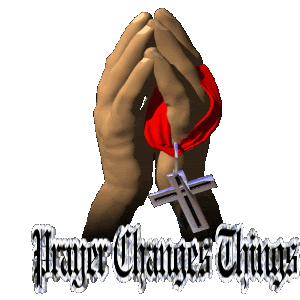Spreading God's Love Thru Prayer
Living With Bipolar Disorder
Defining Bipolar
From Taming Bipolar Disorder by Lori Oliwenstein About This Special Report
Print Article
E-mail Article
What is the definition of bipolar disorder? Simply, it's a mental illness in which you experience episodes of mania that range from mild to extreme, as well as episodes of depression. In reality, however, nothing is that simple. There are different types of bipolar disorder, and they all tend to look different in different people. Some people might experience the classic manic symptoms, while others might have upward mood swings that are so mild they're barely noticeable. Some might go through the classic manic symptoms of grandiosity and extreme elation, while others' manias might send them on shopping sprees or make them extremely irritable. Indeed, there are several different degrees of both mania and depression, each of which has its own variations on the general theme.
The importance of pinning down a definition goes well beyond semantics; the way bipolar disorder and its various aspects are defined determines how you're diagnosed if you seek help from a clinician. The diagnosis you get determines the treatment you get, and the treatment you get might determine how well you are able to live with your disorder. And it all begins with a name.
Mania
No matter what the disorder is called, mania is at its core. Mania is what makes bipolar disorder different from unipolar depression, different from schizophrenia, different from other forms of psychosis. And what makes mania is its energy. Sometimes it's a euphoric energy that propels you through life at breakneck speed, hurling thoughts and ideas at you with such force that you can hardly talk fast enough to keep up with them. And sleep? How can you possibly sleep when there's so much to do, so many profound insights to explore? It would all be too exhausting if it weren't for the psychic caffeine being pumped into your body day and night, sometimes for weeks on end. You feel as if you can accomplish just about anything. In fact, you know you will.
But not all mania is an exciting, if wild, ride. Sometimes manic energy is annoying, even irritating. It won't let you concentrate on one thing at a time. It won't let you sleep. It won't even let you sit down. You have to keep moving, you have to keep doing, no matter how much you want to stop. And so you seek out things that will help you slow down — a drug, alcohol, anything that will dissipate the energy, even just a little.
The classic type of mania — a person giddy beyond reason, full of energy and self-confidence and incredible delusions of grandeur — is true in maybe a quarter of the cases of mania, says S. Nassir Ghaemi, M.D., director of the Bipolar Disorder Research Program at Cambridge Health Alliance and assistant professor of psychiatry at Harvard Medical School. "Many people who are manic are angry or unhappy. They usually don't experience mania as a particularly pleasurable state."
Symptoms
Mania really is the defining concept in bipolar disorder. After all, if you've never experienced mania — or at least hypomania, mania's somewhat subdued sister — you can't be bipolar, at least not according to the guidelines put forth by the fourth edition of the American Psychiatric Association's Diagnostic and Statistical Manual of Mental Disorders. Depression, on the other hand, is not "required" for a bipolar diagnosis, which is somewhat ironic, considering that if you have bipolar disorder, you probably spend about a month depressed for every day you're manic. Of course, your mileage might vary.
Mania's symptoms are usually quite apparent — at least to the people around you. From the inside, it's more difficult to recognize. Mania often cloaks itself in denial and a lack of self-awareness, a sort of literal inability to see yourself clearly or recognize that you're exhibiting symptoms of mania. In fact, this so-called "impaired insight" is itself one of the hallmarks of mania. Others include the following:
Feeling euphoric, "high," speeded up, or irritable
Having an inflated sense of yourself, of your importance, your power, and your abilities (called grandiosity)
Needing little to no sleep, yet still being full of energy
Talking more than usual, or so fast that it's almost impossible for others to follow you
Jumping from thought to thought or idea to idea, and being easily distracted
Being unable to slow down your thoughts or speech even if you wanted to
Being physically agitated, unable to sit still, and hyperactive
Behaving in a self-absorbed, self-destructive manner; drinking too much, taking drugs, having indiscriminate sex, or going on wild spending sprees
If you've experienced three or more of these symptoms at one time, you've probably had a manic episode. But the true test of mania is not so much the symptoms — after all, having a strong sense of self-esteem isn't necessarily a bad thing, and who among us hasn't experienced racing thoughts at one time or another? The true test of mania is that these symptoms have a real impact on your life, a negative impact — such as damaging a relationship, putting you into severe debt, or causing you to lose your job.
Another true test of mania is time. A day of euphoria after a promotion at work, a fleeting feeling of smugness after you pass a test most other people fail — that's not mania. In the medical world, you have to have these symptoms for at least a week to be diagnosed as manic (unless you've been hospitalized for manic symptoms, in which case the diagnosis is immediate).
In addition, true bipolar mania can't be explained away by some other medical condition, such as multiple sclerosis or Huntington's disease, some symptoms of which can sometimes mimic mania. And you're not considered to have true bipolar mania if you've been using drugs associated with mania, such as amphetamines. In fact, although antidepressants can trigger mania in susceptible people, the DSM doesn't consider manias caused by antidepressants to be bipolar manias. This can be problematic, of course, because so many people with bipolar disorder are initially misdiagnosed as depressed and put on antidepressants.
Source: Taming Bipolar Disorder by Lori Oliwenstein is a Psychology Today publication. Psychology Today does not recommend or endorse any company advertised on this site..
Last reviewed: December 7, 2004 | Last updated: December 7, 2004
Copyright © 2004 Lori Oliwenstein. All rights reserved.
Defining Bipolar
From Taming Bipolar Disorder by Lori Oliwenstein About This Special Report
Print Article
E-mail Article
What is the definition of bipolar disorder? Simply, it's a mental illness in which you experience episodes of mania that range from mild to extreme, as well as episodes of depression. In reality, however, nothing is that simple. There are different types of bipolar disorder, and they all tend to look different in different people. Some people might experience the classic manic symptoms, while others might have upward mood swings that are so mild they're barely noticeable. Some might go through the classic manic symptoms of grandiosity and extreme elation, while others' manias might send them on shopping sprees or make them extremely irritable. Indeed, there are several different degrees of both mania and depression, each of which has its own variations on the general theme.
The importance of pinning down a definition goes well beyond semantics; the way bipolar disorder and its various aspects are defined determines how you're diagnosed if you seek help from a clinician. The diagnosis you get determines the treatment you get, and the treatment you get might determine how well you are able to live with your disorder. And it all begins with a name.
Mania
No matter what the disorder is called, mania is at its core. Mania is what makes bipolar disorder different from unipolar depression, different from schizophrenia, different from other forms of psychosis. And what makes mania is its energy. Sometimes it's a euphoric energy that propels you through life at breakneck speed, hurling thoughts and ideas at you with such force that you can hardly talk fast enough to keep up with them. And sleep? How can you possibly sleep when there's so much to do, so many profound insights to explore? It would all be too exhausting if it weren't for the psychic caffeine being pumped into your body day and night, sometimes for weeks on end. You feel as if you can accomplish just about anything. In fact, you know you will.
But not all mania is an exciting, if wild, ride. Sometimes manic energy is annoying, even irritating. It won't let you concentrate on one thing at a time. It won't let you sleep. It won't even let you sit down. You have to keep moving, you have to keep doing, no matter how much you want to stop. And so you seek out things that will help you slow down — a drug, alcohol, anything that will dissipate the energy, even just a little.
The classic type of mania — a person giddy beyond reason, full of energy and self-confidence and incredible delusions of grandeur — is true in maybe a quarter of the cases of mania, says S. Nassir Ghaemi, M.D., director of the Bipolar Disorder Research Program at Cambridge Health Alliance and assistant professor of psychiatry at Harvard Medical School. "Many people who are manic are angry or unhappy. They usually don't experience mania as a particularly pleasurable state."
Symptoms
Mania really is the defining concept in bipolar disorder. After all, if you've never experienced mania — or at least hypomania, mania's somewhat subdued sister — you can't be bipolar, at least not according to the guidelines put forth by the fourth edition of the American Psychiatric Association's Diagnostic and Statistical Manual of Mental Disorders. Depression, on the other hand, is not "required" for a bipolar diagnosis, which is somewhat ironic, considering that if you have bipolar disorder, you probably spend about a month depressed for every day you're manic. Of course, your mileage might vary.
Mania's symptoms are usually quite apparent — at least to the people around you. From the inside, it's more difficult to recognize. Mania often cloaks itself in denial and a lack of self-awareness, a sort of literal inability to see yourself clearly or recognize that you're exhibiting symptoms of mania. In fact, this so-called "impaired insight" is itself one of the hallmarks of mania. Others include the following:
Feeling euphoric, "high," speeded up, or irritable
Having an inflated sense of yourself, of your importance, your power, and your abilities (called grandiosity)
Needing little to no sleep, yet still being full of energy
Talking more than usual, or so fast that it's almost impossible for others to follow you
Jumping from thought to thought or idea to idea, and being easily distracted
Being unable to slow down your thoughts or speech even if you wanted to
Being physically agitated, unable to sit still, and hyperactive
Behaving in a self-absorbed, self-destructive manner; drinking too much, taking drugs, having indiscriminate sex, or going on wild spending sprees
If you've experienced three or more of these symptoms at one time, you've probably had a manic episode. But the true test of mania is not so much the symptoms — after all, having a strong sense of self-esteem isn't necessarily a bad thing, and who among us hasn't experienced racing thoughts at one time or another? The true test of mania is that these symptoms have a real impact on your life, a negative impact — such as damaging a relationship, putting you into severe debt, or causing you to lose your job.
Another true test of mania is time. A day of euphoria after a promotion at work, a fleeting feeling of smugness after you pass a test most other people fail — that's not mania. In the medical world, you have to have these symptoms for at least a week to be diagnosed as manic (unless you've been hospitalized for manic symptoms, in which case the diagnosis is immediate).
In addition, true bipolar mania can't be explained away by some other medical condition, such as multiple sclerosis or Huntington's disease, some symptoms of which can sometimes mimic mania. And you're not considered to have true bipolar mania if you've been using drugs associated with mania, such as amphetamines. In fact, although antidepressants can trigger mania in susceptible people, the DSM doesn't consider manias caused by antidepressants to be bipolar manias. This can be problematic, of course, because so many people with bipolar disorder are initially misdiagnosed as depressed and put on antidepressants.
Source: Taming Bipolar Disorder by Lori Oliwenstein is a Psychology Today publication. Psychology Today does not recommend or endorse any company advertised on this site..
Last reviewed: December 7, 2004 | Last updated: December 7, 2004
Copyright © 2004 Lori Oliwenstein. All rights reserved.
Views: 15
© 2026 Created by Guardian.
Powered by
![]()




 Guardians Prayer Warriors if you would like to go to our Facebook page please click the buttons. If you would like to open up a Guardians Prayer Warriors group on a different site please contact Guardians Ministry so that we may put the name of your site on the page and you can use Guardians Prayer Warrior tags.
Guardians Prayer Warriors if you would like to go to our Facebook page please click the buttons. If you would like to open up a Guardians Prayer Warriors group on a different site please contact Guardians Ministry so that we may put the name of your site on the page and you can use Guardians Prayer Warrior tags.






